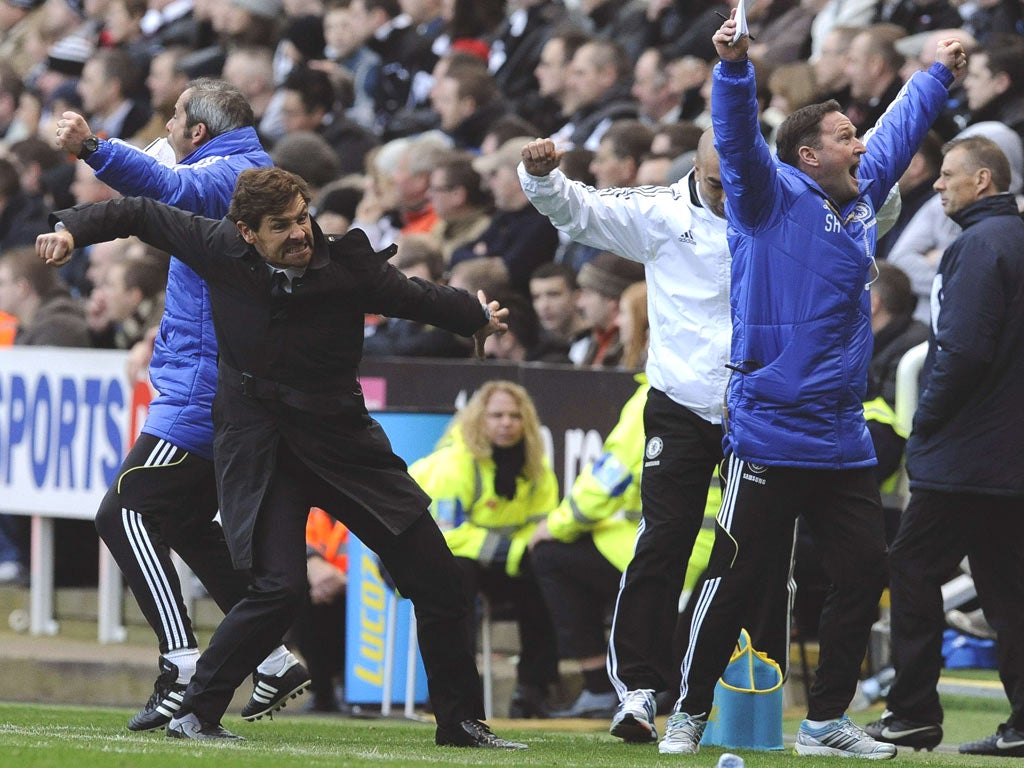
Your support helps us to tell the story
From reproductive rights to climate change to Big Tech, The Independent is on the ground when the story is developing. Whether it's investigating the financials of Elon Musk's pro-Trump PAC or producing our latest documentary, 'The A Word', which shines a light on the American women fighting for reproductive rights, we know how important it is to parse out the facts from the messaging.
At such a critical moment in US history, we need reporters on the ground. Your donation allows us to keep sending journalists to speak to both sides of the story.
The Independent is trusted by Americans across the entire political spectrum. And unlike many other quality news outlets, we choose not to lock Americans out of our reporting and analysis with paywalls. We believe quality journalism should be available to everyone, paid for by those who can afford it.
Your support makes all the difference.It should tell Andre Villas-Boas something that his renewed attack on those television pundits he considers to be persecuting Chelsea was overshadowed by a disclosure that came right from the heart of his club.
The story that Villas-Boas (below) told his players to include him in their goal celebrations, broken by The Sun on Saturday morning, was a classic training ground scoop which any newspaper would have valued.
At least the club, to its credit, did not try to deny the story. "The manager has asked the players to look across and recognise him and his staff on the bench after a goal," a Chelsea spokesman said. "He believes that by celebrating together it shows we are all in it together."
It is the wider significance of the disclosure that should concern Villas-Boas. An instruction he gave in the privacy of the training ground – one aimed at fostering a greater sense of unity in the team – was leaked. On the day he circled the wagons against the tyranny of Gary Neville, the problems again came from inside.
Tonight, Chelsea go into a game against Manchester City that could turn their season and the scale of the task facing Villas-Boas is clear. For all his efforts to shift the focus on to external forces he regards as threats, it is those within that bite deepest.
Villas-Boas is an intelligent young coach with a work ethic that matches his ambitions. But he is in a race against expectations to rebuild this team. He has to remake them in a fashion that is successful and loyal to him and he has to do it rapidly enough to be given another season by an owner who has sacked five predecessors. In some respects, his task bears comparison with the job that faced Sir Alex Ferguson when he took over Manchester United in 1986. Then, Ferguson was also a young manager, although a decade older than Villas-Boas is now. He too was trying to push back against the dominant power of the time – Liverpool, in his case. And, crucially, he realised early on that he had to get rid of a number of seasoned, popular players at United who had enjoyed relative success.
In those days, players such as Norman Whiteside and Paul McGrath were big names in English football. Ferguson was not. But he knew he would have to shift them to rebuild the club from the bottom up. The 44-year-old Ferguson of 1986 had enjoyed more success and experience than Villas-Boas has currently and, unlike Chelsea today, United had not won a league title for 19 years. Ferguson was also afforded more time to effect change than Villas-Boas should expect.
Gérard Houllier did the same at Liverpool with the old brigade, primarily Paul Ince and eventually Robbie Fowler. Roberto Mancini has ousted the core of the Mark Hughes regime at Manchester City, including Carlos Tevez, Emmanuel Adebayor and Craig Bellamy – a process so brutal and public at times that it might have derailed the whole enterprise. But Mancini prevailed.
Arsène Wenger approached the task in a different fashion with the Tony Adams generation at Arsenal. He convinced them to accept his methods instead of getting rid of them immediately – although he did that eventually as well. Either way, all these coaches observe that old rule of Ferguson's that, at his own club, "the manager can never lose an argument".
Should Chelsea inflict on Manchester City their first Premier League defeat of the season then Villas-Boas will have secured his most significant victory yet at the club. It will strengthen his position and bolster his credibility. Like all reformers, he will inevitably make enemies, but the alternative – going with the flow, changing nothing – is unacceptable to any manager with serious ambition.
Join our commenting forum
Join thought-provoking conversations, follow other Independent readers and see their replies
Comments